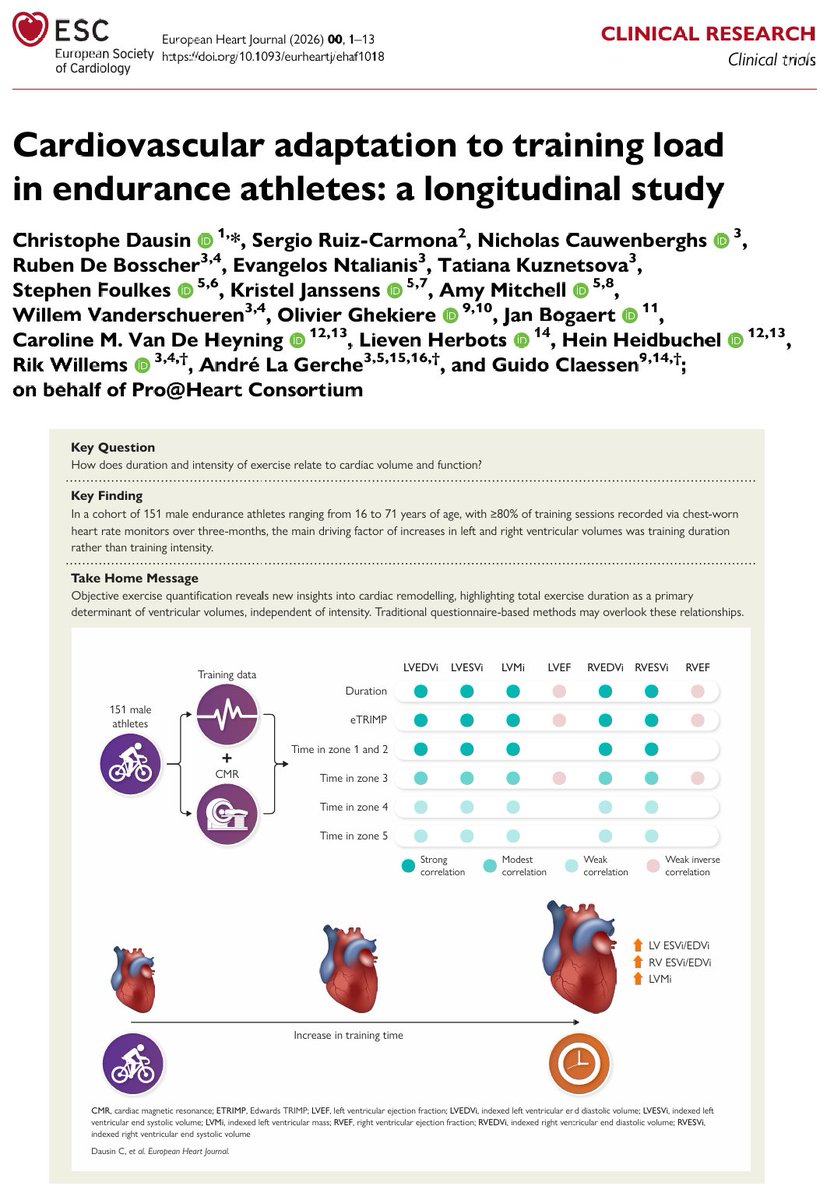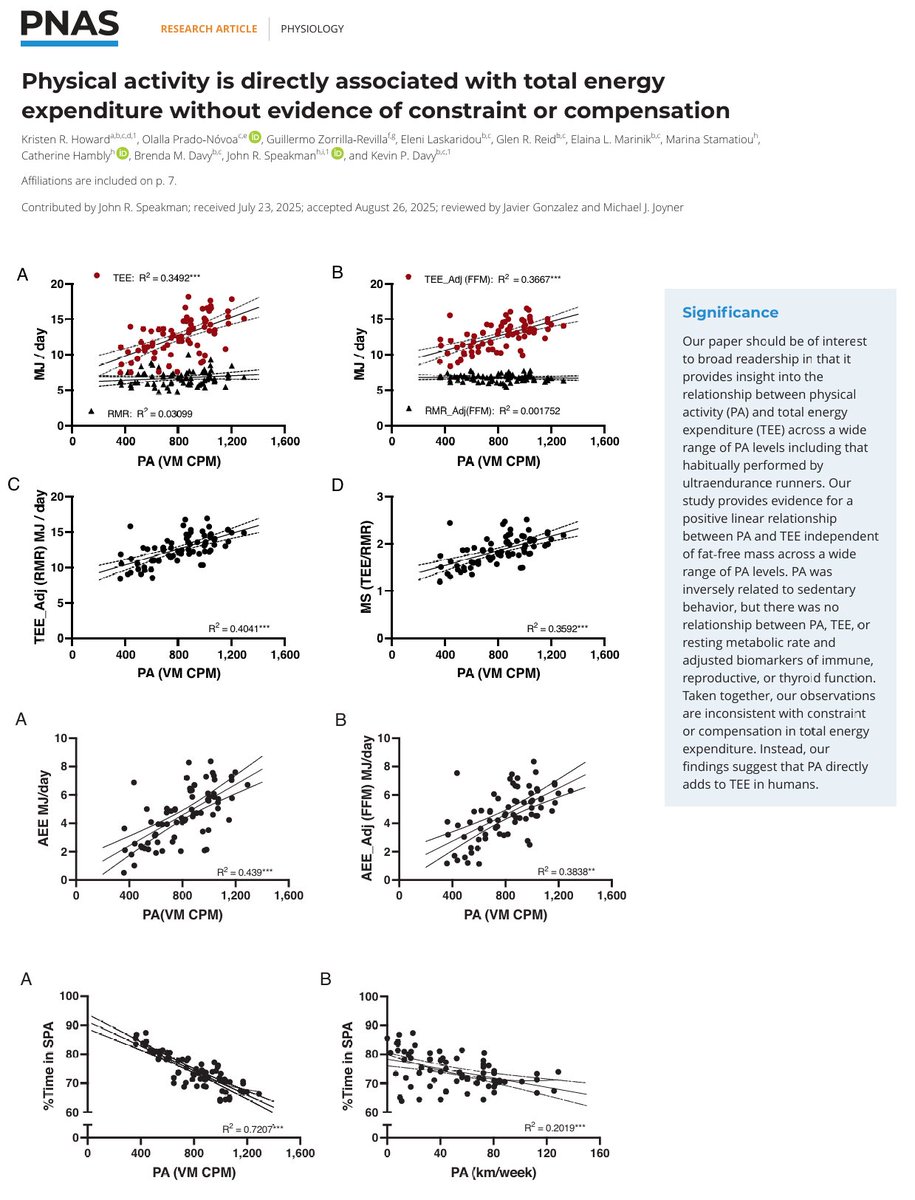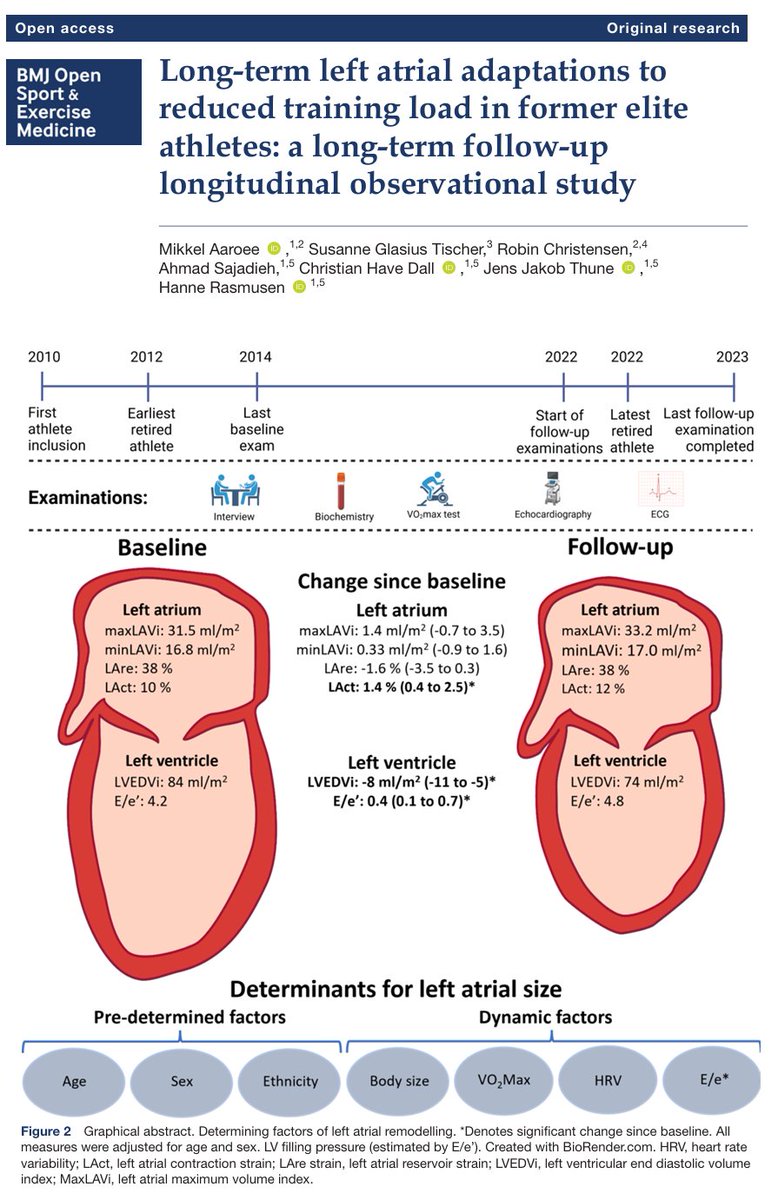A thread about protein-rich diets and body composition regulation.
Studies suggest that body weight loss and maintenance thereafter, on a relatively high-protein diet, appear to be greater under conditions of ad libitum energy intake than under conditions of isoenergetic diets.
doi.org/10.1146/annure…
doi.org/10.1146/annure…
Such diets contain a sufficient absolute amount of protein (usually in the neighbourhood of around 20–30% of total energy) and imply a required normal-protein intake in grams, while energy intake is decreased.
Most of the studies on protein intake in relation to body weight management show an improved body composition (i.e. an increased free-fat mass/fat mass ratio) that can lead to an improved metabolic profile with a relatively high-protein diet.
The net impact of dietary macronutrient composition on energy homeostasis, and therefore on body weight control, depends on the sum of its effects on energy intake, energy expenditure, and substrate balance.
doi.org/10.1016/j.cmet…
doi.org/10.1016/j.cmet…

Several mechanisms have been proposed to be responsible for the weight-loss promoting effect of high-protein diets.
An increase in diet-induced thermogenesis (i.e. a component of total energy expenditure) is among the most commonly cited ones.
An increase in diet-induced thermogenesis (i.e. a component of total energy expenditure) is among the most commonly cited ones.
Isocaloric meal test studies have clearly demonstrated the thermogenic advantage of dietary protein, with measured thermic effects of food for single nutrients being 0–3% for fat, 5–10% for carbohydrate, and 20–30% for protein.
doi.org/10.1051/rnd:19…
doi.org/10.1051/rnd:19…
The food-induced increase in energy expenditure (i.e. diet-induced thermogenesis) is made up of two components: an obligatory component required for the digestion, transport, and (predominantly the) storage of nutrients, and a facultative component of heat production.
Effectively then, all this implies that for every 1000 kcal ingested as protein, about 200–300 kcal are spent during digestion, transport, and storage processes, compared to 50–100 kcal for carbohydrate and 0–30 kcal for dietary fat.
One of the main reasons for this is that the theoretical biochemical efficiency of protein in theory can be said to be around 84%, which is low.
In practice, studies in animals, infants and children have shown that the requirements for its deposition are typically even higher.
In practice, studies in animals, infants and children have shown that the requirements for its deposition are typically even higher.
A value that is frequently used is 2.38kJ per kJ of energy deposited (1.38kJ extra energy required to deposit 1kJ worth of protein), which translates to 55.3 MJ/kg, assuming the value of protein is 23.5 kJ/g.
This means that to make fat-free mass, in theory, requires an additional energy ingestion of 32.43 MJ per kg of protein deposited (55.3 MJ/kg, which is the total cost of protein deposition minus 23.5MJ, which is the energy value of protein).
But here things take a bad turn. See, the efficiency of conversion of ingested protein into lean body mass declines when protein is ingested in sufficient amounts or more (around 1.3 g/kg BW/d).
doi.org/10.1093/nutrit…
doi.org/10.1093/nutrit…
That said, this decline can be markedly suppressed by resistance training, suggesting that resistance training may contribute to maintaining or improving the efficiency of protein anabolism.
Similarily, whole-body protein turnover increases in response to habituation to a high protein diet...
doi.org/10.1093/ajcn/6…
doi.org/10.1093/ajcn/6…
doi.org/10.1093/ajcn/n…
doi.org/10.1093/ajcn/6…
doi.org/10.1093/ajcn/6…
doi.org/10.1093/ajcn/n…
...meaning higher losses during fasting mediated by increased rates of proteolysis.
doi.org/10.1042/cs0860…
doi.org/10.1042/cs0860…
doi.org/10.1042/cs0860…
doi.org/10.1042/cs0860…
That said, there is data that suggests that this effect can be attenuated by EEA supplementation, but perhaps in tandem with resistance training.
doi.org/10.1016/j.clnu…
doi.org/10.1016/j.clnu…
Of the protein ingested, approximately 45% will be extracted by splanchnic tissues before entering peripheral circulation and only ~10% of the ingested protein will be utilized for skeletal muscle protein synthesis...
doi.org/10.1371/journa…
doi.org/10.1371/journa…
...while the rest of it will be catabolized. This 10% contributes about 25% to postabsorptive whole-body protein synthesis.
doi.org/10.1152/ajpend…
doi.org/10.1152/ajpend…

Besides dietary factors, physiological factors have also been shown to impact the incorporation of dietary protein-derived amino acids into muscle tissue.
For instance, resistance-type exercise enhances the capacity to incorporate dietary protein-derived amino acids into muscle tissue for at least 12 hours.
doi.org/10.1152/ajpend…
However, post-exercise cooling reduces this effect.
doi.org/10.1113/jp2789…
doi.org/10.1152/ajpend…
However, post-exercise cooling reduces this effect.
doi.org/10.1113/jp2789…
Exercising before a meal has been shown to result in greater de novo muscle protein synthesis
doi.org/10.3945/ajcn.2…
doi.org/10.3945/ajcn.2…
High-intensity aerobic and resistance-type training increase de novo muscle protein synthesis for for 24–48 hrs.
doi.org/10.1152/ajpend…
doi.org/10.1152/ajpend…
doi.org/10.1152/ajpend…
doi.org/10.1152/ajpend…
On the other hand, short-term muscle disuse results in lower de novo muscle protein synthesis.
doi.org/10.1152/ajpend…
doi.org/10.1152/ajpend…
Therefore, it is evident that physical activity and inactivity are important factors modulating the capacity to utilise dietary protein-derived amino acids as precursors for de novo muscle protein synthesis.
So I guess you get it by now. Making muscle is not easy and the effects of protein on body composition are not straight-forward to predict.
To make things even worse, the theoretical biochemical efficiency of fat is 98%, with studies usually estimating the requirements for its deposition to be more than half than the ones for protein...
...with a frequently used value being 1.17kJ per kJ of energy deposited (0.17kJ extra energy required to deposit 1kJ of fat), meaning that it will always be easier to put on fat. This translates to 45.513 MJ/kg, assuming the value of fat is 38.9 kJ/g.
This means that to make fat, in theory, requires an additional energy ingestion of 6.613 MJ per kg of fat (45.513 MJ/kg, which is the total cost of fat deposition minus 38.9MJ, which is the energy value of fat).
In other words, that additional energy ingestion of 32.43 MJ will mostly go towards storing fat and not result in that much muscle, as 1 kg of weight gain requires approximately that much additional energy for the average person.
doi.org/10.1093/ajcn/5…

doi.org/10.1093/ajcn/5…


To summarize, it would make sense that a too low absolute protein intake contributes to the risk of body weight regain, an “absolutely required” amount of protein in the diet is sufficient for weight loss, body fat loss, and weight maintenance...
...but an elevated amount of protein in the diet is necessary for improving fat-free mass and resting energy expenditure.
It appears then, that there are observations with respect to protein intake and energy efficiency under certain conditions that can lend support to the "Stock hypothesis"...
which states that when people overeat a diet that contains either high or low protein, they are less "metabolically efficient" than diets of average protein intake.
doi.org/10.1038/sj.ijo…
doi.org/10.1038/sj.ijo…
Alas, subsequent studies failed to reproduce this theoretical "metabolic inefficiency" of high-protein diets.
doi.org/10.1001/jama.2…
doi.org/10.1001/jama.2…

This has also led many researchers to form the "protein leverage" hypothesis of obesity.
doi.org/10.1111/j.1467…
doi.org/10.1111/j.1467…
This postulates that the body seeks to consume a target level of dietary protein and lowering the protein fraction of diet leads to compensatory increases in overall energy intake thereby resulting in obesity.
However, the protein content of the food supply did not significantly decrease during the rise in US obesity prevalence. 

Further, not only several studies, both short term and long term, in humans and animals both have failed to reproduce this effect...
doi.org/10.3945/ajcn.1…
doi.org/10.3945/ajcn.1…
doi.org/10.1038/s41591…
doi.org/10.1016/j.cmet…
doi.org/10.1016/j.cmet…
doi.org/10.3945/ajcn.1…
doi.org/10.3945/ajcn.1…
doi.org/10.1038/s41591…
doi.org/10.1016/j.cmet…
doi.org/10.1016/j.cmet…
but higher-protein diets should also show greater levels of adherence and outperform other ones in terms of weight regain (calling those outcomes a hit-or-miss is probably true).
sci-fit.net/adhere-ketogen…
sci-fit.net/adhere-ketogen…

So in this one, the group that lost the most muscle also had the greatest adherence?
What?
This table clears everything up.
What?
This table clears everything up.

So the groups that increased or maintained their protein intakes also had the greatest adherence and we can actually say that this is reflected in the studies that show FFM maintenance is crucial for weight loss maintenance. It's the protein intake.
After all, increases in fat-free mass can lead to increased hunger and weight gain as well, at least in persons with sub-optimal FFM.
doi.org/10.3390/nu1301…
doi.org/10.3390/nu1301…
This is underscored by the phenomenon that under iso-energetic conditions no statistically significant difference between body weight loss on a high-protein or high-carbohydrate diet has been shown.
doi.org/10.1038/sj.ijo…
doi.org/10.1038/sj.ijo…
The explanation for all this is that satiety is a key factor in applying relatively high-protein diets.
This can be demontrated by the fact that even though the greater thermogenic effect of high-protein diets appears to be insufficient to induce more weight loss than low-protein diets when comparisons are made at fixed energy intake...
pubmed.ncbi.nlm.nih.gov/8856395/
pubmed.ncbi.nlm.nih.gov/8856395/
under ad libitum feeding conditions subjects eat less from relatively high-protein diets than under iso-energetically fed conditions.
doi.org/10.1093/ajcn.8…
doi.org/10.1093/ajcn.8…
This is to say, just because the Protein leverage and Stock hypotheses are not true, that doesn't cancel the fact that protein is satieting.
As a matter of a fact, it should probably be the basis of your diet.
As a matter of a fact, it should probably be the basis of your diet.
To sum up, as far as fat loss is concerned, protein's unique role in satiety is what sets it apart from other macronutrients, with benefits in fat-free mass and DIT in a distant second and third place.
Addendum: @kevinnbass has added another nail in the coffin. Please see:
https://twitter.com/kevinnbass/status/1405053670287282183
• • •
Missing some Tweet in this thread? You can try to
force a refresh











